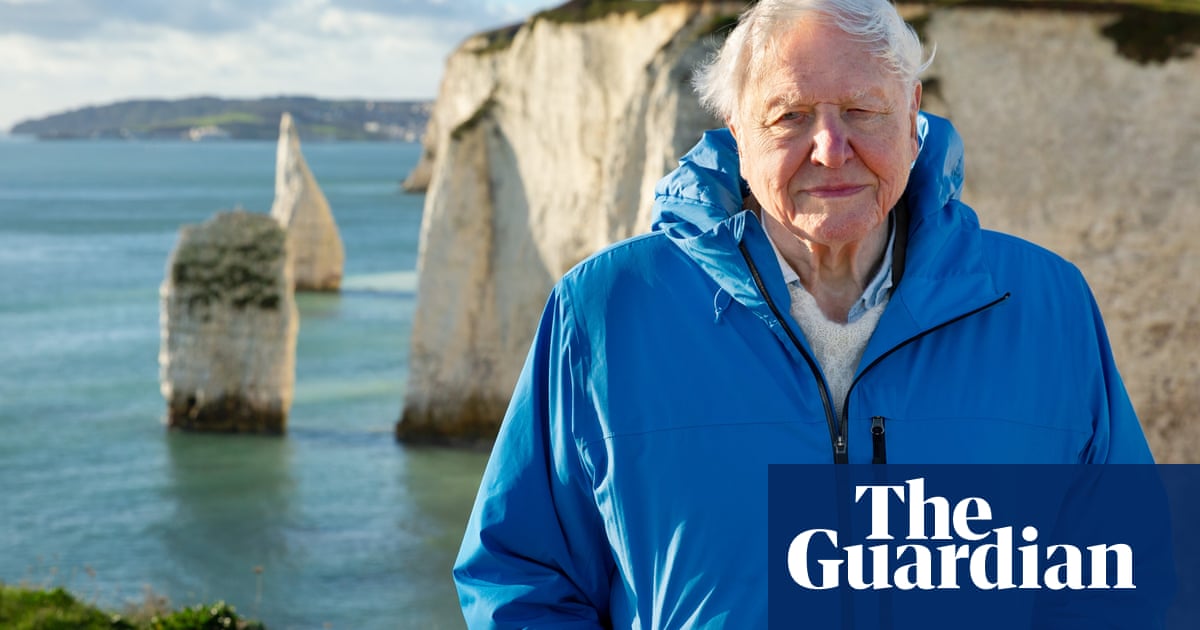SirDavid Attenboroughalmost drowned when testing a scuba-diving helmet for his 1957 dive on the Great Barrier Reef, the broadcasting veteran has revealed in a discussion with Prince William.
Discussing his latest documentary, Ocean, the pioneering film-maker described the incident to the Prince of Wales.
“It’s certainly a strange thing to do,” said the99-year-old Attenborough, as he nostalgically fitted an original version of Jacques-Yves Cousteau’s open-circuit scuba helmet over his head.
“Don’t do that, David,” laughed the prince. “You won’t get it off.”
Successfully wriggling out of the helmet, Attenborough reminisced. “When I put mine on for the first time, I suddenly felt water coming around [my chin and up over my mouth]” he said. “I thought, ‘This can’t be right’. And by the time [the water rose to my nose], I thought, ‘I’m sure this is not right’.
“But then, of course, if you got this thing screwed on top of you, you can’t breathe. You can’t even make yourself heard, you know: ‘Get it off me!’” he added.
Attenborough related how a testy director of operations refused to believe the equipment had a fault. “So he put it on and I’m happy to say he went under the water and came up even quicker than I did (“Blimey”, interjected the prince), because there was actually a fault.”
Ocean, Attenborough’s new National Geographic documentary special, confronts the enormity of the loss in ocean life. It will become available for streaming globally on Saturday 8 June, World Ocean’s Day.
In the film with the prince, publicising the documentary’s release, Sir David describes how the world knew very little about the intricacies of life in our oceans when he took his first dive.
Attenborough spoke of how the experience was a “sensory overload”. But now, he said, the same dive in Australia’s shallow warm water cay is likely to look disastrously worse: globally, corals have suffered tremendous loss as a result of human-causedocean warming.
“Dave, from what you’ve obviously seen over the years, what states would you say the oceans were in right now?” asked the prince in the film, which will shortly be posted on Kensington Palace social media platforms.
“The awful thing is that it’s hidden from you and from me and most people,” replied Attenborough. “The thing which I was appalled by when I first saw the shots taken for this film, is that what we have done to the deep ocean floor is just unspeakably awful.
Sign up toWhat's On
Get the best TV reviews, news and features in your inbox every Monday
after newsletter promotion
“I mean, if you did anything remotely like it on land, everybody would be up in arms,” he said. “If this film does anything – if it just shifts public awareness – it’ll be very, very important, and I only hope that people who see it will recognise that something must be done before we destroy this great treasure.”
Attenborough said he hoped that by confronting the destruction of the ocean, the next generation will be inspired to save it.
He told the prince: “What is heartening, really, is that we have the entrée to people’s front rooms – whole families, sitting at home in comfort – can actually suddenly see this coming up. Films like this can expose something new.”
Prince William agreed that we must remain optimistic about ocean recovery: it is vital, he said, for stabilising the climate and securing a healthier future for us all.
“I wonder whether this should be a moment for optimistic excitement for the next generation,” he asked Attenborough. “They can become bigger explorers and find more data. The next 50 years will be incredible.”
Attenborough agreed. “Yes. Very much so.”
